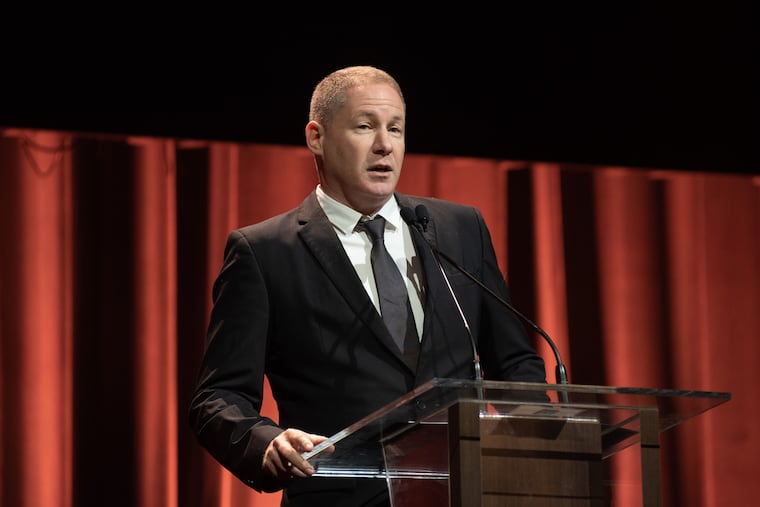Dan Tadmor is the new leader of Philadelphia’s Jewish museum on Independence Mall
Tadmor comes from Israel, where he ran Tel Aviv’s ANU Museum of the Jewish People, which bills itself as the largest Jewish museum in the world.

Philadelphia’s Jewish museum has a new leader.
Dan Tadmor has been named president and CEO of the Weitzman National Museum of American Jewish History, the museum announced Tuesday.
Tadmor, 60, has been CEO since 2012 of Tel Aviv’s ANU Museum of the Jewish People, which bills itself as the largest Jewish museum in the world. After seeing the institution through a $100 million overhaul and reopening in 2021, Tadmor says he was ready for something new.
“I have tremendous respect for the Weitzman, and I’ve collaborated with it. And so when the opportunity came up, it looked like a challenge that really drew me. The role and the message really has never been more important.”
Tadmor has already begun phasing into the job and arrives in Philadelphia just before the new year to begin his three-year contract, he said. He follows Misha Galperin, who announced a year ago that he would be stepping down.
The museum experienced a rocky period after opening its new building on Independence Mall in 2010. Facing debt from construction costs, the National Museum of American Jewish History (as it was then called) filed for Chapter 11 bankruptcy protection in 2020, emerging in 2021. It was renamed for Stuart Weitzman after the shoe entrepreneur made a gift that allowed the museum to pay off its debt and purchase the building.
The amount of that gift was undisclosed, but an Inquirer review of the museum’s tax forms indicates that it was about $25 million.
Earlier this year, the museum announced that it was seeking to become part of the Smithsonian Institution.
Before his work in museums, Tadmor was a media executive. He was CEO of Tel-Ad, a cable and satellite company specializing in the production of television channels, and before that CEO of Music 24, a TV channel broadcasting music and music-related programming in Israel. Previously he worked in publishing on both the editorial and business sides.
He earned a bachelor’s degree in political science from Hebrew University of Jerusalem, and was an Israel Defense Forces major serving in Unit 8200.
Tadmor has lived in Israel his entire life except for the years between ages 9 and 13, when his father was consul general of Israel in San Francisco. “That’s where I picked up my second language and my second culture,” he said.
Tadmor admitted to feeling pangs about leaving his home country now. For one thing, he has family there — two adult sons, a daughter entering the military, and two grandchildren. And then there’s what it means to be moving at what he calls a crucial moment in Israel’s history.
“Yes, there’s part of me that [feels] a little bit of uneasiness about leaving Israel at this juncture. Absolutely,” he said, speaking via Zoom from his home in Rehovot. “But I’m going to be traveling back and forth a lot. I’m certainly going to come back to vote, whenever that will be.”
He said the only times he’s been to Philadelphia were the two visits associated with interviewing for the Weitzman post — “I did not expect to love it so much” — and that he will be looking for a home within walking distance of the museum.
Among his charges here will be continuing the effort to become part of the Smithsonian, and to “reimagine” a new core exhibition. It’s been well over 20 years since the current core show was planned and opened, he points out.
“A lot has taken place in these 20 years. We’re talking about thematic museums. Thematic museums tell stories. And you could claim that the story hasn’t changed, but it has as well. There’s been a lot of shifting and moving. But also the way in which we tell stories both technologically, but also just in terms of storytelling, all of those evolve.”
Any changes at the museum will require more fundraising.
“We need to first make sure that we know what we want to say, what we want to express, and then we will raise funds to make that possible. That’s the way it is in our business — you dream and then you go out and get the money you need in order to make those dreams come true. It always has to start with a solid story.”
Tadmor is conscious of the fact that he’s coming into the job at a time when reports of antisemitic incidents in the U.S. have risen sharply — as have reported hate crimes against other groups, according to FBI statistics — and he says the Weitzman has several roles to play.
“One is, let’s make sure that people have the facts, that people are not ignorant, whether it’s Jews or non-Jews, that people are familiar with the real story of the Jewish people.
“It won’t be an antidote to people who set out to simply hate. Of course, not single-handedly, but a museum can play a part in addressing that ignorance or misunderstanding or misinformation or disinformation. Some antisemitism is based on just good people misguided.”
The museum can also help to bolster Jewish literacy and confidence, he says.
“One way in which Jews can deal with antisemitism is, let’s make sure that we are safe and confident in our identity.”